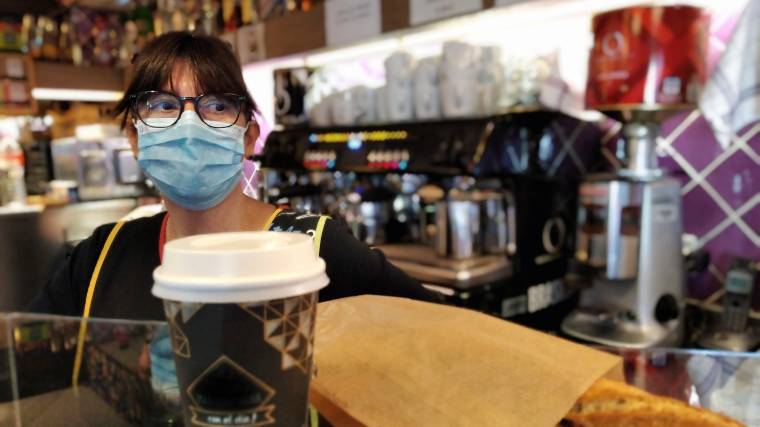A Guide to Tipping in the Age of Social Distancing

Because of COVID-19, many restaurants have added food delivery and carryout options. What’s more, grocery and food deliveries have spiked. This also means that fewer people are dining in and servers and restaurant staff might not receive as much in the way of tips.
An unfortunate jumble of circumstances in the hospitality industry brought on by the pandemic—limited capacity, many consumers tightening their purse strings due to financial hardship—means that those who rely on tips as part of their overall compensation are being hit hard.
How has social distancing, quarantine, and state-wide lockdowns, where carryout and delivery have now become the norm, changed the etiquette of tipping? We asked some experts to weigh in:
Understand the Importance of Tipping During Covid
First, know exactly why tipping — and tipping the proper amount — is important, explains Sharon-Frances Moore, an etiquette coach and creator of Shances.
If we’re talking about restaurant workers, servers and hosts might be classified under a tipped employee. And depending on which state they live in, if they make over a certain amount in tips each month, they might have a lower minimum wage.
Again, it depends on the state you live in. For instance, in the state of California, you’ll receive a minimum wage of $12 or $13 no matter how much you rake in from tips. But in Arkansas, if you receive at least $30 in monthly tips, your minimum wage gets bumped down from $10 an hour to $2.63 an hour. At the federal level, the minimum wage for tipped employees is $7.25 an hour. But hit that $30 threshold for tips in a month and you’re looking at a minimum cash wage of $2.13.
“In short, employers may and often do pay employees less than standard minimum wage,” says Moore. “The thought is that tips will bring the employees take-home pay up to the amount of standard minimum wage. Often worker's tips constitute their ability to make a living wage.”
And for those who are delivering groceries or takeout, they’re performing frontline work. Instacart drivers earn at least $5 per a delivery-only batch, and a minimum of $7 to $10 for each shop and delivery batch. Tipping can really make a difference with their earnings.
Tip More If You Can
So, how much should you tip?
If you’re picking up groceries or are receiving a to-go order from a restaurant, you should tip at least 10%, says Sharon-Frances. If you’re picking up a large order or if the driver has to travel a farther distance, consider giving a larger tip.
Bonnie Tsai, the founder and director of the consulting agency Beyond Etiquette, recommends tipping the following amounts:
Restaurants
- Dining in: 20-25% of the pre-tax total
- Take out: 15-20% of the pre-tax total
Delivery drivers
- Delivery drivers: 20% of the bill
- Pizza delivery (or deliveries where the bill is generally pretty small): $5.00 to $7.00 flat, depending on the size of the order and the difficulty of delivery
Consider Tipping Those Who Don’t Usually Get Tipped
Traditionally, those who work in service industries — think hotel maids, car valets, hair stylists, restaurant workers, and delivery folks — receive tips. While that hasn’t changed by any means, you might also want to go beyond and think about any frontline workers who put themselves in harm’s way to receive a tip.
But some of these frontline workers — nurses, grocery store workers, post office workers — may not be allowed to receive monetary tips, explains Moore. If that’s the case, then consider getting them a thank-you note with a gift card.
Tip Within Your Means
Of course, those are just guidelines. By no means should you overextend yourself, points out Tsai. “This extra or more generous tipping may not last if the economy continues to decline and the customers' budgets become tighter.”
“It’s also important for workers to remember that if a customer gives you a larger tip than usual, do not expect it to become the norm or take it for granted as things will continue to shift during these unprecedented times.”
If you would prefer to tip more generously, then consider eating out less, getting delivery less, or batching your grocery orders. When getting food delivered is a special event versus a regular occurrence, you might be able to afford to tip a little more each time.
Practice Empathy and Generosity
During these times when working at a grocery store or post office means risking your health, it’s particularly important to practice kindness, empathy, and generosity whenever possible. “These workers may not have earned any income during the quarantine,” says Tsai. “As patrons, we should keep in mind that these workers are risking their health and safety in order to provide us a service; therefore if we can tip more if we can do so.”
Moore adds that tipping above the standard should be considered as service employee's jobs have become more important and challenging. “Their occupations have become dangerous, as their basic duties place them in a position of increased potential exposure to Covid-19,” she says.
“Further, the rise of the number of interactions between workers and highly emotional, volatile and stressed customers has made an already tough job even more difficult. These new dynamics of service jobs should be compensated through tipping at a higher rate.” Whether it’s through kind words or a thoughtful gesture, give in whatever manner you’re able to. It could make a difference in these frontline worker’s lives.
















